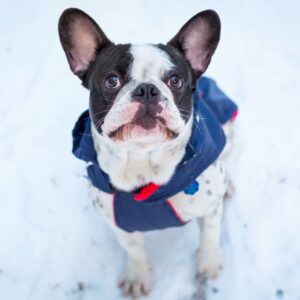MSPCA-Angell @MspcaAngell

Winter temperatures can plummet hourly and pets should be kept safe from the effects of these frigid conditions. Below are several tips to keep your pet warm and away from harm this season.

Winter temperatures can plummet hourly and pets should be kept safe from the effects of these frigid conditions. Below are several tips to keep your pet warm and away from harm this season.
- Keep your pets warm and indoors. As always, cats
should stay inside. Since cats left outdoors may stay warm in car wheel
wells or under hoods, you should awake any sleeping animals by rapping
on your car hood before starting the engine.
- Trips outside should remain short during the winter months. While dogs need outdoor exercise, lengthy walks can prove harmful especially when wind chill is a factor.
- Dogs should remain leashed and supervised when outdoors throughout the year. However, in the winter, do not bring them near bodies of water even if they appear frozen.
- Shorthaired dogs such as Greyhounds, Beagles,
Chihuahuas and clipped breeds should be dressed in protective clothing.
Dogs can develop frostbite and hypothermia if exposed to freezing
temperatures for too long. While some breeds may have thick fur coats
and enjoy being out in the snow (for example Arctic dog breeds), many
others do not have thick fur coats and might need a little help to stay
warm. When looking for a jacket, make sure it does not restrict your
dog’s movement, and is simple to take on and off.
- Wipe off your dog’s foot pads and stomach fur with a
damp towel after returning from the outdoors. It is important to clean
between the pads, as salt and snow can end up in this area. Dogs should
not be allowed to lick at their paws after they have been walking on
surfaces treated with salt, as this could result in significant
ingestion of salt, which can be toxic. If your dog will tolerate wearing
boots, this is a good option. They will help prevent exposure to salt
and other irritating ice melt products, give them added traction on
slippery icy surfaces, and help to prevent them from cutting their paws
on sharp ice. If your pet will not wear boots, try using “Musher’s
Secret”, a wax formulated to protect paw pads.
- When purchasing an ice melt product, try to obtain one that is labeled as pet safe.
- Outdoor shelters for pets should be dry, secure
from wind and only large enough for them to stand up, turn around and
lie down. The shelter floor should also be elevated from ground level
and have dry bedding. A steady water supply should be provided in
plastic bowls and checked on frequently so that it does not freeze.
- Pets that spend a greater amount of time outdoors also require more food.
- Antifreeze products containing ethylene glycol are highly toxic
and can produce life-threatening kidney damage, even in small amounts.
While Massachusetts now requires antifreeze to contain a bitter testing
agent, some old antifreeze may still exist and it is still safest to
assume an animal could drink it and prevent access. Many windshield
washer products contain methanol, which if ingested can cause drooling,
vomiting, drunkenness and severe central nervous system depression.
- Have Fun!!
https://www.mspca.org/angell_services/pet-tip-cold-weather-safety/
No comments:
Post a Comment